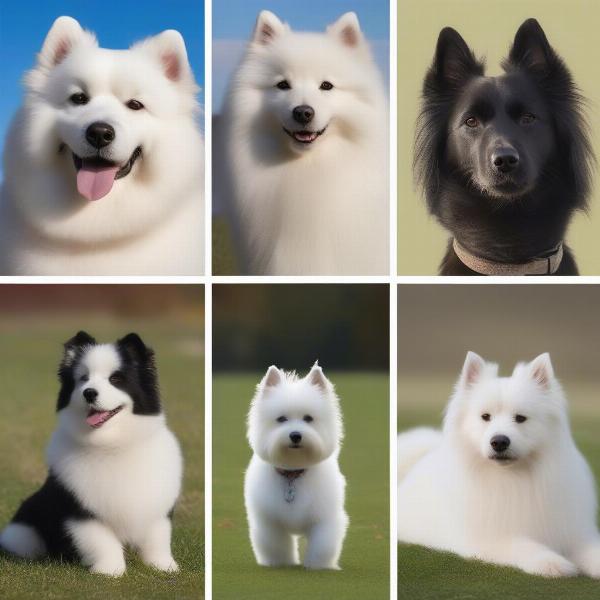Ivory coat dogs, with their pristine and elegant appearance, capture the hearts of many. Whether you’re considering adding a creamy-white companion to your family or already share your life with one, understanding their specific needs is crucial for their well-being. This guide explores everything from breed selection to grooming, offering valuable insights into providing the best possible care for your ivory coat dog.
Choosing the Right Ivory Coat Breed
The term “ivory coat dog” encompasses various breeds, each with unique characteristics and temperaments. Some popular choices include Samoyeds, American Eskimo Dogs, and West Highland White Terriers. Researching different breeds is crucial to finding the perfect match for your lifestyle. Consider factors like energy levels, grooming requirements, and potential health concerns. For example, Samoyeds are known for their thick double coats, requiring regular brushing, while West Highland White Terriers have a wiry coat that needs less frequent grooming.
 Choosing the Right Ivory Coat Breed
Choosing the Right Ivory Coat Breed
Health and Medical Care for Ivory Coat Dogs
While their coat color doesn’t directly influence their overall health, certain breeds are predisposed to specific conditions. For instance, Samoyeds can be prone to hip dysplasia and progressive retinal atrophy. Regular veterinary checkups, a balanced diet, and appropriate exercise are essential for maintaining your ivory coat dog’s health.
Grooming Your Ivory Coat Companion
Maintaining that pristine white coat requires dedicated grooming. Regular brushing helps prevent matting and removes dirt and debris. Using shampoos specifically designed for white coats can help brighten the fur and prevent staining.
Nutrition and Feeding
A balanced diet is fundamental for any dog, but ivory coat breeds may have specific nutritional needs. Consult with your veterinarian to determine the appropriate food type and portion size for your dog’s age, breed, and activity level.
Exercise and Activities
Ivory coat dogs, like all dogs, need regular exercise to stay physically and mentally healthy. The amount and type of exercise will vary depending on the breed. Samoyeds, for example, are energetic and enjoy activities like hiking and agility training, while West Highland White Terriers are happy with shorter walks and playtime in the yard.
Conclusion
Caring for an ivory coat dog is a rewarding experience. By understanding their specific needs and providing them with proper care, you can ensure your furry companion lives a long, healthy, and happy life. Remember to research different breeds if you’re considering adding one to your family, and always consult with your veterinarian for personalized advice. From choosing the right breed to grooming and nutrition, providing a loving and supportive environment is key to enjoying the companionship of your ivory coat dog.
FAQ
- What are some common ivory coat dog breeds? Some popular ivory coat breeds include Samoyeds, American Eskimo Dogs, West Highland White Terriers, and Cream Chow Chows.
- How often should I groom my ivory coat dog? The frequency of grooming depends on the breed and coat type. Generally, brushing several times a week is recommended.
- Are ivory coat dogs more prone to specific health issues? Certain breeds, like Samoyeds, can be predisposed to conditions like hip dysplasia.
- What type of food should I feed my ivory coat dog? Consult your veterinarian to determine the appropriate food type and portion size for your dog’s specific needs.
- How much exercise does an ivory coat dog need? The exercise requirements vary depending on the breed and individual dog.
Related Articles
ILM Dog is your trusted resource for comprehensive information on dog care and breed selection. We offer expert advice on health, training, nutrition, grooming, and much more. From puppy care to senior dog support, ILM Dog is here to help you every step of the way. Contact us today for personalized guidance: [email protected] or +44 20-3965-8624. Visit us online at ILM Dog.